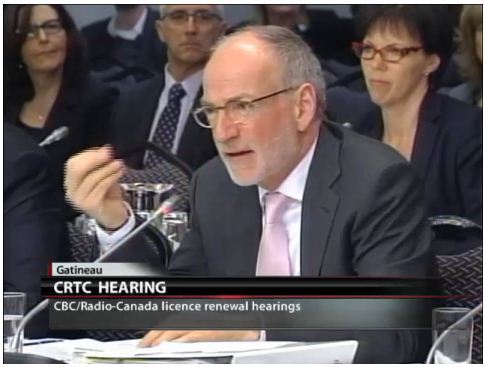
GATINEAU – The Canadian broadcast environment has changed considerably since 1999, the last time CBC/Radio-Canada appeared before the CRTC for a licence renewal hearing, and the changes in the world since requires an utterly new regulatory framework for the national public broadcaster, the corporation told the Commission on the first days of its licence renewal hearing Monday.
Direct-to-home satellite TV was only emerging, cells phones were for calling, and YouTube and Facebook were years away from even being thought up then, Hubert Lacroix, CBC president and CEO said during his opening remarks. Now, with the myriad devices and applications used to conventional TV, we’ve witnessed a dramatic change in the broadcast environment over the last number of years. And just as the sector has changed, so has CBC.
“We have evolved into an integrated multi-platform broadcaster,” Lacroix said, then explaining a different approach to regulating the CBC is now in order. “That is why we have proposed a simplified approach which would impose a package of significant, high-level commitments in key areas, and eliminate the plethora of obligations and soft commitments which typified the approach of the 1990s.”
In its presentation, CBC highlighted its 2015 plan (which has endured some modifications) as the way forward (it even showed a short video). But since the CRTC is likely to issue licence renewal decisions in 2013, Commission chair Jean-Pierre Blais wondered if the plan was a little short sighted given licence terms are usually five or seven years.
Lacroix (pictured in a CPAC.ca screen cap as the cable channel is carrying the hearing online) described the plan as a road map that unites under a single umbrella all actions the corporation will take over the next few years. But this doesn’t mean activities under this plan will stop that year, he said, adding investments in regions and in digital platforms will continue. “This is a normal evolution,“ argued Lacroix.

“How do we then frame the renewal that goes well beyond 2015 if you’re telling me that there’s likely to be adjustments?” asked Blais, referring to the difficulty with which to approve licence renewals without knowing the CBC’s plan to 2017.
“The axes on which we are pushing right now, the investments that we’re making, the choices that we…are doing in the programming piece, they are going to continue on. What you will then see in 2015, 2016 and 2017 is our adjustment to the environment of that time, trying to constantly keep CBC/Radio-Canada a modern, efficient and a very active broadcaster in the lives of Canadian citizens,” Lacroix explained.
The new, lighter-handed regulatory framework CBC is requesting was also put under some scrutiny during the opening day’s hearing.
Steven Guiton, VP and chief regulatory officer at CBC, explained the corporation’s approach to its licence renewal was born out of a 2009 CRTC decision (2009-411) that called for a regulatory framework that would give all TV broadcasters the flexibility “to adapt to the rapidly changing communications environment while ensuring that the Canadian broadcasting system is distinctly Canadian.”
“That’s what we’ve tried to do in coming to you with this application today is to put forward something that’s very strong in terms of conditions of licence for Cancon, for PNI (programming of national interest), for local programming on the television side and on significant commitments for Canadian content on the radio side. We’re trying to do that in the spirit of finding that balance that you struck for the whole industry,” he said. “And we’re coming to you with what we think is the best balance.”

CBC countered suggestions that it’s trying to get out of some key reporting obligations within a more flexible regulatory framework.
“What we’re trying to say is rather than have a whole variety of conditions that may or may not be useful” said Guiton, “we wanted to come forward with some really strong conditions of licence for you.”
Foreign feature films is an example of something CBC reports on, yet provides little value. “We have no regulatory obligation with respect to foreign feature films, yet we report on it. What we’re trying to do is actually condition-of-licence strong, [CRTC and CBC] working together to identify what it is the commission thinks it needs exactly to feel it’s granting some flexibility while still getting that Cancon that you think is important.”
Commission gets into the weeds
As the first day of the hearing wound down, the CRTC dug into some of the specifics of CBC’s proposals. Commissioner Elizabeth Duncan wondered how the CBC would be able to meet its conditions of licence if it lost the broadcast rights to NHL.
Lacroix said the environment will be different in two years and changing the corporation’s condition of licence even before negotiations “I don’t think this is something that makes any kind of sense.” Besides, Guiton added, if something “catastrophic” happened, CBC would have to appear before the Commission to discuss the impacts on the delivery of its other services.
Duncan also delved into the proposals of adding advertising to Radio 2 and Espace Musique, one of the most contentious requests the CBC has made in its license renewal. She wondered what would happen if the proposal is denied.
Lacroix said that the money generated from advertising on those two radio properties goes “way beyond” those two services, they go to general programming. If the proposal is denied, it would affect other pieces of our programming, he added.
The hearing continues Tuesday morning at 8 a.m. with the Commission digging into the Corp’s French services.



